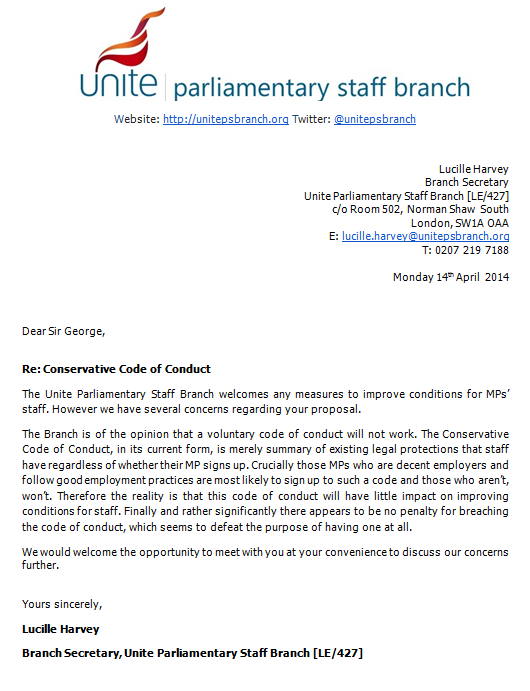By Lucille Harvey
It is farcical that the employment regulations that MPs put into law are not accessible to their own staff.
Revelations about the treatment of MPs’ staff are unsurprising to those of us who have worked for a Member of Parliament. Sexual harassment, on the scale that Channel 4 News uncovered, is symptomatic of a culture where abuse of power and impunity are rife. A culture that allows the harassment, bullying and exploitation of staff to go unchecked and unchallenged but moreover a culture that, at times, has been complicit in covering up it up.
How is this possible in any modern workplace, let alone the Mother of Parliaments? The truth is that while in theory MPs’ staff are protected by employment rights, in practice these rights are hard for us to access.
The House of Commons is set up as 650 individual offices with MPs receiving their staffing budgets from IPSA and then free to organise their office as they wish. As such, employment contracts are between staff and the MP, who are commonly both employer and line manager. When the relationship between the MP and staff member is good, this arrangement is workable. However, if the relationship falls into difficulties problems arise.
While technically MPs’ staff are covered by the legal protections that all workers have under UK law, the reality is that, for us, these legal protections are not easily accessed. To take a grievance against your employer, it will be heard by your line manager who often is the MP. Therefore you have the perverse system where the subject of the grievance can be the same person who hears the grievance and decides if it is progressed or dismissed. As you can imagine, this system produces very low success rates for staff regardless of the merits of their case.
Take the case of Unite Parliamentary Staff Branch member Marion Kinley. Ms Kinley found herself being victimised by her then employer Jim Devine MP. She attempted to take out a grievance against him with the House Authorities only to be told that as the MP was her employer, she’d need to take out the grievance with him, despite the fact that he was the subject of said grievance. Rather unsurprisingly, Devine chose to dismiss the grievance against him and then suspended Ms Kinley. As in other industries, it’s clear that MPs’ self-regulation doesn’t work.
None of the proposals that have been announced in the last week will do much to tackle this fundamental issue. The Unite Parliamentary Branch welcomed the introduction of a Speaker’s Helpline. But without comprehensive overhauling of the current grievance procedures nothing will change. A staff member calling to make a complaint of harassment against their MP will serve little purpose if they’re just directed to raise this with their employer, the MP who’s harassing them. Nor will the Conservatives’ voluntary Code of Conduct work. MPs who follow good employment practices will sign up, and those who don’t, won’t.
Most importantly, partisan solutions are not the answer. All staff deserve equal protections at work; why should a researcher in the next door office have fewer rights than me because they fall under a different party’s code of conduct? We cannot replace one unjust system with another.
It doesn’t have to be this way. The Unite Branch has come up with four ways to radically improve conditions and tackle the most unhealthy aspects of this culture.
First, we need the introduction of independent mediation for staff. The fundamental flaw of the current grievance system is the absence of natural justice. A simple solution would be to introduce an impartial third party so staff have access to a fair hearing.
Second, a bullying & harassment policy that covers all MPs’ staff and volunteers. The Branch believes that an across the board policy is the only feasible solution.
Third, we need mandatory training for all MPs in good employment practice. Some problems arise due to a lack of knowledge rather than malintent on the MP’s part. Many MPs have not previously had the experience of being employers and are unaware of their responsibilities. This can be easily remedied through training.
Finally, we need collective recognition for the Parliamentary Staff Branch. Currently, MPs can choose whether they recognise the union or not. Voluntary arrangements like this just don’t work. The most vulnerable staff, those in most in need of trade union representation, are the ones least likely to work in offices where the Branch has a recognition agreement, as unscrupulous employers tend not to support trade unions.
The best solutions prevent problems from arising in the first place. These suggestions would significantly improve conditions for staff and employment relations generally but they could also potentially save the taxpayer money. Between 2006 and 2011, tribunal pay-outs to MPs’ staff cost the taxpayer £350,000. I’m sure we can all think of ways that money could have been better spent; I’ve listed a few above for starters.
The farcical situation by which the employment regulations that MPs put into law are not accessible to their own staff needs to end. We deserve better – it’s time the House got its house in order.
This article originally appeared in the New Statesman on 17 April



